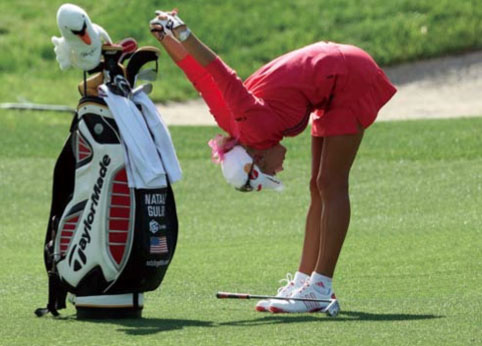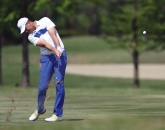 Forget buying a new driver to increase your length off the tee. If you want to prevent injury, increase your levels of energy during your round and hit the ball further than you have ever done before then you should be participating in a physical conditioning program that addresses the various and specific needs of golfers.
Forget buying a new driver to increase your length off the tee. If you want to prevent injury, increase your levels of energy during your round and hit the ball further than you have ever done before then you should be participating in a physical conditioning program that addresses the various and specific needs of golfers.
In the past, golf was treated as a leisurely pursuit, one that could be played effectively without physical conditioning of any sort. Then, as physically fit players such as Tiger Woods and Annika Sorenstam began to dominate the Tour with their explosive power, efficiency, flexibility, and ability to compete with boundless energy week after week, the rest of the golf world took notice. Watch any PGA, LPGA or Asian Tour event, and you’ll see that the most successful players are also the best-conditioned. Fitness has indeed become an integral part of the preparation process for competition, as golfers now realize that a better body means better performance.
Tiger Woods, in a recent interview with Men’s Fitness, let the world in on part of the secret to his success, saying that he “treats golf as a sport” and “lets other people treat it like a hobby”. Tiger is no stranger to hard work. He trains 5 to 6 days a week (even during tournaments), doing about 40 minutes of stretching, core work, runs of up to 7 miles and weights, since he feels that “it would be asinine for someone not to work out and go play football. It doesn’t make sense for golf either”.
Golf should indeed be treated as a sport. The swing itself is a complex athletic movement that involves moving the whole body in a coordinated sequence, generating power to strike the ball and launch it great distances with accuracy. The ability to repeat the swing 40, 50 or more times a round and walk for 3 to 5 hours in the heat demands endurance. The ability to carry your golf bag or hit out of thick rough requires strength. Hitting from the sand or an awkward lie requires balance. Rotation of the trunk and shoulders during the swing requires
flexibility. Power, endurance, strength, balance, and flexibility—just part of the puzzle that makes golf such a wonderful and challenging sport!
Having a stronger body will help you to play better golf, but there’s more. Fit golfers also suffer from fewer injuries than their unfit counterparts. The majority of injuries in golf are overuse-related injuries such as tendonitis of the elbow or low-back pain. In any given round, with an average score of 90, a player may swing a club well over 200 times (including practice swings and a bucket of balls at the range). Any area of weakness in the body will be more susceptible to injury after that many repetitions. Poor technique, improper warm-up and ill- fitting clubs will also increase a golfer’s injury rate. With each injury requiring an average of 5 weeks of recovery time, prevention through exercise becomes ever more important.
So what can we do to get fit for golf and prevent injury? Here’s some tips to help you stay healthy and perform better:
- Strength train: Pumping iron will strengthen your muscles, tendons, and bones, so you can generate more force will less effort.
- Stretch: Improving your flexibility will allow you to rotate your body for a longer swing, adding yards to your shots and lessening your chance of soft tissue strains.
- Core training: Training the muscles that affect your spine will help you to avoid low back pain and to hit the ball with greater control.
- Cardiovascular training: Fatigue at the end of the round or after walking up hills in the Hong Kong heat can cause you to hit sloppy shots and ruin your scores. The more fit your heart, the more energy you’ll have throughout the entire round.
- Warm up: Loosen up your muscles and joints before playing and they will work more efficiently.
- See a professional: Proper technique and club-fitting are paramount to peak performance and injury prevention.
- Nutrition: If you want to perform like a well-oiled machine, then give your body the right fuel to keep your energy levels up and feel good.
Hopefully by now you agree that improving your fitness will improve your golf game. Looking at the bigger picture, not only will your hard work pay off in lower golf scores and fewer injuries, but you’ll also feel and perform better in every other aspect of your life.
Click here to see the published article.











